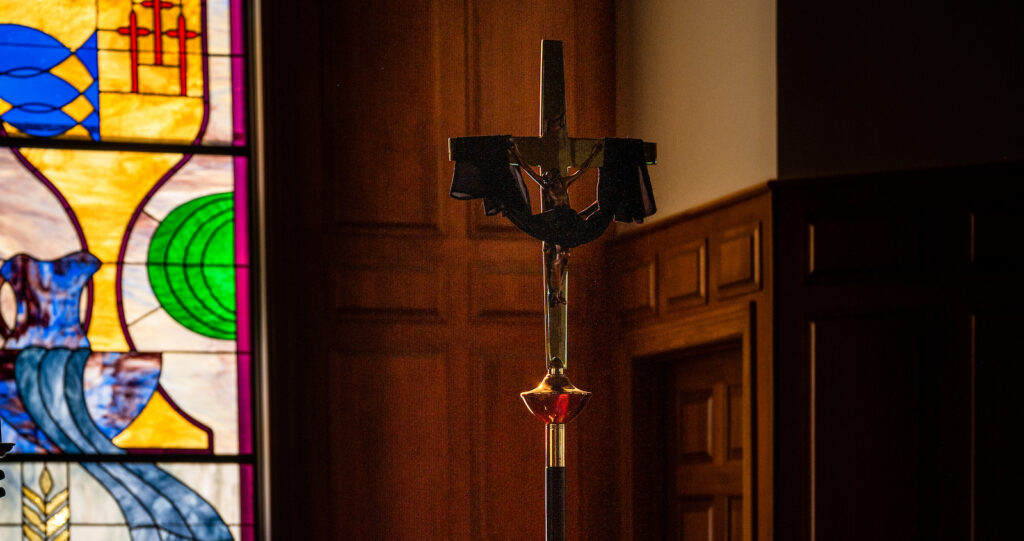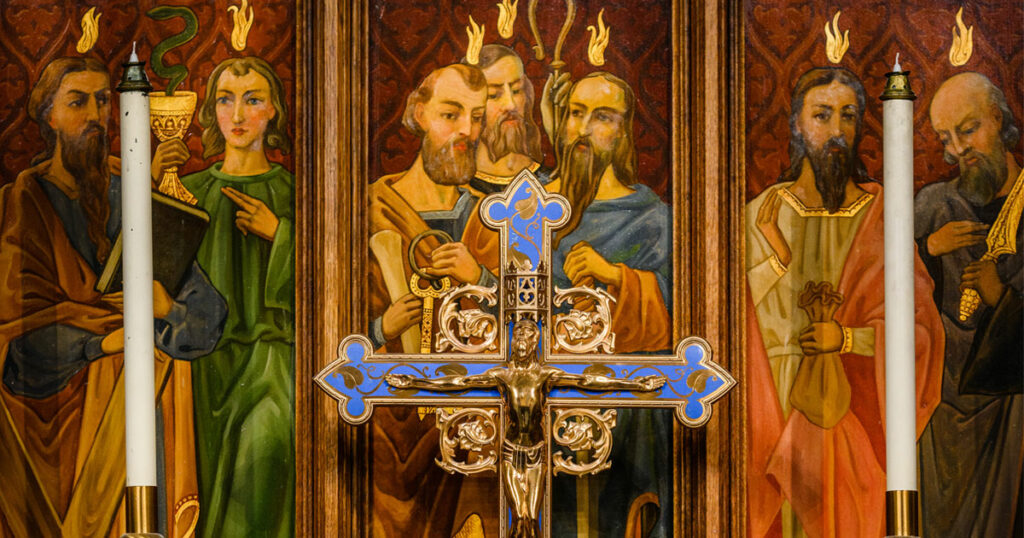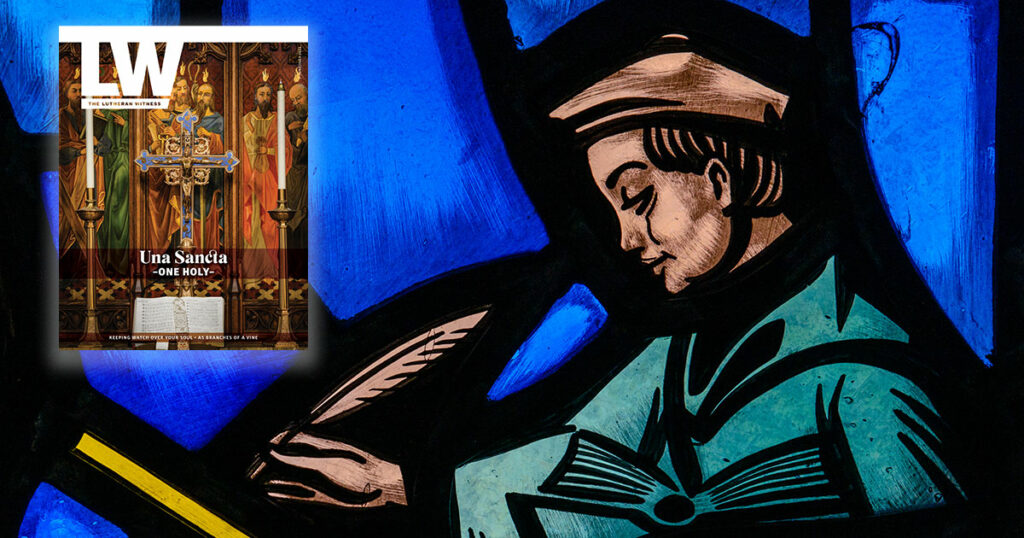by Matthew C. Harrison
“Fear not, little flock, for it is your Father’s good pleasure to give you the kingdom” (Luke 12:32).
The kingdom of heaven is God’s good Gospel gift. Luther commented, “If our dear Father were not to give the kingdom to us, we would never buy it from Him or earn it. The word is give, give, give. Therefore, we should thank Him with a cheerful heart and not boast about our worthiness” (Luther, St. L. IX.1812; my translation).
John the Baptizer saw this kingdom in Jesus and confessed it loudly and clearly: “Behold, the Lamb of God, who takes away the sin of the world” (John 1:29). Jesus taught clearly that the kingdom of God came in His person, His acts and His preaching. “The time is fulfilled, and the kingdom of God is at hand; repent and believe in the gospel” (Mark 1:15). Jesus also tells us the kingdom of God has to do above all with the Gospel. “And He went throughout all Galilee, teaching in their synagogues and proclaiming the gospel of the kingdom” (Matt. 4:23). The kingdom is preached and believed. “He said to them, ‘I must preach the good news of the kingdom of God to the other towns as well; for I was sent for this purpose’” (Luke 4:43). The kingdom is received by faith. “Truly, I say to you, whoever does not receive the kingdom of God like a child shall not enter it” (Mark 10:15). The kingdom comes and exists on earth, yet Jesus said, “My kingdom is not of this world” (John 18:36). His kingdom is here and now yet fulfilled in eternity. “Truly, I say to you, I will not drink again of the fruit of the vine until that day when I drink it new in the kingdom of God” (MARK 14:25). Christ Himself defines the mission of His disciples until the end of time: “Go therefore and makes disciples of all nations, baptizing … [and] teaching” (Matt. 28:19–20).
On earth, God’s kingdom is the Church Militant, the struggling church. It is the totality of all believers in Christ’s Gospel of free forgiveness by His cross and resurrection, no matter who they are or where they find themselves. The church is at once exclusive (“No one comes to the Father except through Me” [John 14:6]) and completely inclusive (“For God so loved the world, that He gave His only [begotten] Son, that whoever believes in Him should not perish but have eternal life” [John 3:16]). The church is at once hidden, for no one can see faith in the heart (“You have died, and your life is hidden with Christ in God” [Col. 3:3]), and manifest in the marks of the church. The Word of the Lord does “not return … empty” (Isaiah 55:11), and so we know where the kingdom of God is on this earth: precisely where the Word of God is preached and Baptism and the Lord’s Supper are both administered according to Christ’s institution and intent. These are the marks of the true church.
We see the Word of God in use along with Baptism and the Lord’s Supper far beyond our fellowship in the LCMS. And we thank God that wherever these are kept, even if partially hidden by false teaching, Christ creates believers. The church is hidden also under its divisions, and even under false teachings (1 Cor. 3). The New Testament uses the same word for the entirety of believers (in the sense of the Nicene Creed’s “one holy Christian and apostolic church”; for example, when Jesus said, “on this rock I will build My church” [Matt. 16:18]) as it does for a local gathering or congregation of believers (for example, “the church of God that is in Corinth” [1 Cor. 1:2]). The word sometimes indicates a group of believers in a whole region: “The church throughout all Judea and Galilee and Samaria had peace and was being built up” (Acts 9:31). In every case, the church is the Body of Christ, made up of “saints” or “holy people” (see Eph. 1:1; Phil. 1:1). Because these believers are baptized into Christ, they are one body. “So we, though many, are one body in Christ, and individually members one of another” (Rom. 12:5).
As individuals have different gifts and weaknesses, so do churches or congregations. This we see clearly in the New Testament. Paul praises all the local churches that are the recipients of his letters (1 Cor. 1:4–9), yet in these same letters he lays out the terrible problems he sees that must be corrected if the Gospel is to be retained (Galatians). Some of the congregations Paul addresses or speaks about are quite large. Others are small, like the church in Macedonia (2 Cor. 8:1–15). Just like today, there were large churches in urban areas and hundreds of small churches across the far-flung population. Some lacked pastors, and Paul called on his helpers to ordain men for them (Titus 1:5). Some were experiencing terrible factions (Corinth, Galatia), false teachers and false doctrine. They were failing to hold to apostolic teaching and therefore the very words of Jesus. The Gospel was at stake! Jesus had warned, “Beware of false prophets” (Matt. 7:15). Some churches were wealthier (Corinth), some poorer Macedonia). Some faced intense persecution (Thessalonica; church in Asia Minor; see also 1 Peter 1).
We have many similar challenges today in the LCMS. Thank God we have broad doctrinal unity. Our doctrinal convention resolutions — even on the challenging issues — receive overwhelming majorities (94% against women’s ordination, 88% for closed Communion, and similar numbers for maintaining the order of worship). But some of these issues chafe here and there. We have large, very gifted congregations. We have many more small and even very small churches, which also have their gifts. We have personalities. We have church workers, congregations and schools that are suffering for various reasons. The culture is relentless in its attack against the mind and teaching of Christ. But here we are. In the midst of all this — just like at the time of the apostles — “the kingdom of God is at hand.” This message of Jesus and His free forgiveness continues to grab hearts. We have great pastors. We have great lay leaders and congregants. We’ve all got our strengths and weaknesses. The weaknesses are given that we not boast in ourselves, for as St. Paul says, “When I am weak, then I am strong” (2 Cor. 12:10). We have Christ. Or shall I say rather, Christ has us.
“Fear not, little flock, for it is your Father’s good pleasure to give you the kingdom” (Luke 12:32).
–Pastor Matthew C. Harrison






